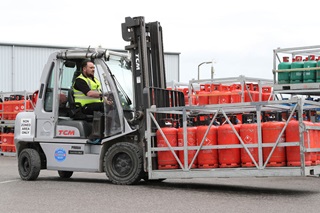FLT Myth Buster #2: Diesel is the tried-and-tested ‘safe choice’

Diesel has long been the ‘go-to’ fuel for FLTs. Historically, a diesel engine truck has been superior to electric models, owing to its lifting capabilities. They were also perceived historically as able to operate well on gradients, and generally offer reasonable maintenance and servicing costs.
However, emissions and air quality are big areas where diesel struggles, and this is fast becoming the main reason why fleet managers are deciding to source alternative fuels. While exhaust fumes and diesel particulates may be able to easily escape to the atmosphere when used outside, the pressure for greener, more environmentally-friendly FLT fuels is accelerating.
Let’s use an example to demonstrate just how dramatic a difference the switch from diesel to LPG can make to a fleet’s emission levels. For a fleet of 20 diesel FLTs in operation for 14 hours a day, six days a week, these would produce annual CO2 emissions totalling 524 tonnes. Should they switch to BioLPG, however, these emissions fall to just under 300 tonnes, representing a reduction of over 200 tonnes, or 43 per cent. These reductions could be integral to organisations under pressure to focus on more sustainable business practices.
While exhaust catalysts and purifiers can reduce noxious emissions, these still only make the machines acceptable for occasional indoor use. In contrast, LPG emits 98 per cent less particulate matter than diesel, and these emissions are lead- and soot-free. This means LPG-fuelled FLTs can be used in sensitive production environments, such as food and pharmaceutical manufacturing facilities. When also fitted with a three-way catalyst, hydrocarbon and carbon monoxide emissions drop to virtually zero.
As such, diesel is no longer seen as the ‘go-to’ fuel and is quickly falling out of fashion due to its impact on air quality. This is especially true for fleet managers that are investing in new FLTs or those with a lease renewal coming up.
To find out more about LPG fuelled FLTs, head over to our FLT page.